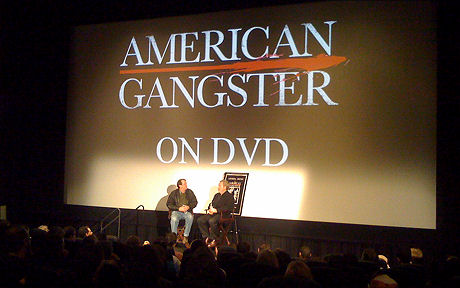Film Jerk’s Edward Havens has his annual Oscar handicap articles up. Stats, stats, and more stats. The Best Picture article is of particular interest. Havens predicts No Country but personally favors Michael Clayton among the five nominees and picks The Assassination of Jesse James by the Coward Robert Ford as the best of all the ’07 films.
Day: February 20, 2008
Fincher into “Black Hole”
David Fincher is attached to direct a film based on Black Hole, the Charles Burns graphic novel about a sexually transmitted virus among teens that causes strange growths and tears in the skin. AIDS yuckfest! Plan B and producer Kevin Messick are developing for Fincher, Paramount Pictures and MTV Films. Beowulf screenwriters Roger Avary and Neil Gaiman wrote a Black Hole screenplay in 2006. Alexandre Aja (The Hills Have Eyes, High Tension) was previously attached to direct.

Lunar eclipse
I just ran out onto Melrose to see the lunar eclipse. It’s something like 50% or 55% dark now, but the moon is so low in the L.A. sky right now you need to be out in the open and looking east without any buildings or trees obscuring.
Spielberg kneel-down
I’m saying nothing about this Rec Show article, which is a full journalistic equivalent of an intimate act performed upon Steven Spielberg. Key statement: “Spielberg is to movies what the Beatles are to music. You can follow in his footsteps, but you cannot top him.” It’s mostly YouTube video clips, so I don’t know what there is to mull over.
McCain steps in it
The just-up N.Y. Times report about a possibly romantic relationship eight years ago between John McCain and a lobbyist named Vicki Iseman (40 now, 32 then) is a bombshell, yes, but something feels insufficient. The events in the story happened so many years ago with the intimacy angle being denied by both parties — there’s no photo, no salacious evidence — that one wonders what the real-dirt story is.


Upside: doesn’t McCain seem slightly younger now?
The story seems to be primarily saying now that McCain is as flawed as the next guy and maybe given to intemperate behavior in this or that area. Nobody has a perfect record. It’s entirely fair for news reporters to explore character issues of Presidential candidates, but a part of me is feeling badly for the guy. Matters of this nature should be off-limits unless some form of deliberate harm or cruelty was involved, or some form of provable corruption or lack of integrity was demonstrated.
“Convinced the relationship had become romantic, some of [McCain’s] top advisers intervened to protect the candidate from himself,” the story reads, “instructing staff members to block the woman’s access, privately warning her away and repeatedly confronting him, several people involved in the campaign said on the condition of anonymity.
“When news organizations reported that Mr. McCain had written letters to government regulators on behalf of the lobbyist’s clients, the former campaign associates said, some aides feared for a time that attention would fall on her involvement.”
If there are concrete facts or at least strong indications that Iseman’s clients may have benefitted with some form of favorable treatment in political or financial matters that McCain had domain over, where are they? There are allegations about “key telecom legislation before the Senate Commerce Committee” but I haven’t absorbed the particulars at this stage. The Drudge Report posted a story last December about McCain trying to get the Times to spike the story.
McCain’s statement about the story: “It is a shame that the New York Times has lowered its standards to engage in a hit-and-run smear campaign. John McCain has a 24-year record of serving our country with honor and integrity. He has never violated the public trust, never done favors for special interests or lobbyists, and he will not allow a smear campaign to distract from the issues at stake in this election.
“Americans are sick and tired of this kind of gutter politics, and there is nothing in this story to suggest that John McCain has ever violated the principles that have guided his career.”
Legislative track records
If MSNBC’s Chris Matthews had asked me to name some of Barack Obama‘s legislative accomplishments (as he did last night with Texas State Senator Kirk Watson, causing him to look like a total doofus when he couldn’t name a single one), I would have said that legislative accomplishment and the give-and-take of relationships within a legislative body is considered to be a different game, requiring differing skills and strengths, than dispensing inspirational leadership and applying organizational focus.
I then would have offered to give Matthews the whole Obama legislative as soon as he names the legislative accomplishments of JFK during his eight years in the Senate. (He did next to nothing of historic proportion — he coasted.) And Bobby Kennedy‘s record during his three and a half years as a New York Senator…same deal. Tell me one drop-to-your-knees thing that Abraham Lincoln did in the Illinois legislature, I would also ask. The issue would be moot.
“No Country’s” soundtrack
Carter Burwell‘s “score” and Skip Lievsay‘s sound effects in No Country for Old Men are comprised of “the occasional barely audible hum and whine of undefinable instruments at moments of tension,” writes Slate‘s Jan Swafford. “As in many film scores there’s a recurring motif: the keening and howling desert wind.
“Its meaning is revealed at the end, when Sheriff Moss delivers a mournful soliloquy accompanied by the wind. The last thing we hear before the credits is the wind and the ticking of a clock. It’s not just about death. It’s the desert that is eternal and doesn’t care about all the human messes played out on its surface, and the wind that will outlast us all.
“You could say the rest of the sound in No Country rises from that wind: the flat tones of the voices, the hum of engines and the whoosh of the road, the barely audible drones of instruments that fade in and out of other sounds, or are terminated by gunshots. As the demon killer throttles his first victim, the sound of a locomotive appears out of nowhere; it tells us this guy is a rampaging machine that cannot be diverted from its track by mere human flesh.
“Sometimes the Coens wield a terrifying silence that does the job of, say, Max Steiner‘s old, stabbing threat-and-suspense chords, and does it better. How all this works can be heard in a scene near the end. Sheriff Bell stands before the door of a motel room, knowing the demon may be on the other side. What we hear is the distant wail of wind, a distant train barely audible, a falling hum of motor somewhere, a low drone of music fading to silence.”
All together, there’s only about 16 minutes worth of “music” in No Country.
Jewison Oscar talk
I’ve been trying to whip together a New York Post article about the parallels between Oscar contenders of 2007 vs. 1967. Norman Jewison, director of In The Heat of the Night (which won the Best Picture Oscar), was kind enough to promptly call back today and offer some thoughts. At the end of our chat we digressed a bit and got into Best Picture Oscar talk.
I asked Jewison if he’s heard any talk about Juno as Best Picture. “That escapes me,” he said. “It’s a very smart script… what I call smart-ass dialogue. I think it has a brilliant performance. But I don’t like what it says. Yeah, have a baby and then you give it away. It’s pro-life, at least. Go have a baby, give it to that crazy [character played by Jennifer Garner]? I didn’t like what the film said. That aside, it’s smartly directed and well acted and very well written piece.”
What about No Country for Old Men? “Nobody I’ve talked to, including some very smart [professionals], hasn’t been a little disturbed by the ending of that film,” he said. “They say it this way. They say we don’t mind you killing off the hero…we don’t mind that at all…but not to show it is wrong. There is a little bit of…there are people who find that unsatisfying. I myself think it’s the best picture of the year. I really like the Coen Brothers. I adored Fargo.”
What about There Will Be Blood? “A very strong and intense performance [by Daniel Day Lewis], maybe even stronger than the film. But those first 20 minutes with no dialogue are brilliant. The realism of films today is a signature thing. When I was coming up it was the neo-realism of Italian cinema of the late 40s and early 50s. That was the influence, the thing that everyone was looking at. But today violence…it’s become an element [unto itself]. Beating some guy to death with a bowling pin?”
Michael Clayton “is talking about morality, it’s got something to say, it’s brilliantly executed, the performances are strong, the direction was tight and the editing was tight. So you’ve got a good strong film, and if you don’t like violence, if that turns you off then maybe Michael Clayton is [the ticket].”
“Juno” everywhere?
A director friend, currently prepping a film in London, wrote me a four-word e-mail last night: “I’m hearing Juno everywhere.” Meaning that British-based Academy members are telling each other over lunches and at parties that they like Juno as a Best Picture nominee more than No Country or There Will Be Blood or Michael Clayton, even. Everywhere I turn, everyone I talk to, the talk is rife that a left-field Best Picture upset may be in the offing.
I don’t believe it. I can’t believe it. How could No Country win all those guild awards and not be the clear front-runner?
One thing I’m fairly convinced of is that Michael Clayton stands a much better chance of stealing the Best Picture Oscar than Juno. I would be flabbergasted if either of these films takes it (as well as shattered, floored, dumbfounded, stunned, appalled) but if No Country or There Will Be Blood has to lose to a dark horse, I would prefer that it be Clayton. I would very, very upset if Juno wins. Who would be delighted about that besides the filmmakers and Fox Searchlight?
I wrote my director friend right back last night and asked “What do you mean ‘everywhere’? Who are you talking to? Directors? Art directors? Below the line? Actors?” He wrote right back: “Producers.”
A “Wild Things” re-shoot?
Extremely well placed sources have told CHUD’s Devin Faraci that Spike Jonze‘s Where The Wild Things Are is the subject of a “behind-the-scenes debate” at Warner Bros and Legendary as the suits are very unhappy with the film and with the lead child actor (i.e., Max Records) and want to reshoot essentially the whole picture.
I’m not trying to be a smart-ass, but George Prager‘s impression of the trailer was that it looked like plushie porn. He was being perverse, of course, but if Jonze’s original Wild Things (actors in animal costumes that are obviously “costumes”) is tossed, I can imagine an underground market developing among plushie porn enthusiasts, in the same way that a way-before-Stonewall, Eisenhower-era gay following coalesced around Billy Wilder‘s Some Like It Hot.
Cinematical Oscar predix
Cinematical is running its usual spate of oddball Oscar predictions, talking to wackjob savants like Jose the Cabbie and Filipino bartenders on a cruise ship. James Rocchi has posted the Ernest Borgnine Oscar predictor (up now at 8:10 pm Pacific). Cinematical has also posted some “serious” predictions.
Scott’s “Gangster” discussion

Q & A between Pete Hammond, American Gangster director Ridley Scott following last night’s screening of the extended director’s cut at West L.A.’s Landmark plex — Tuesday, 2.19.08, 10:25 pm
